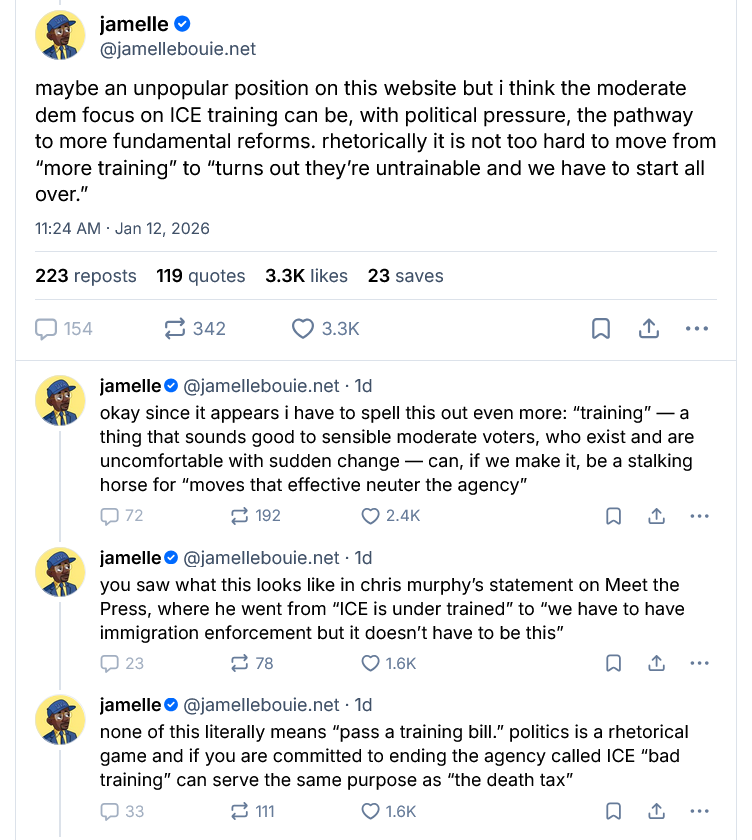THREAD. I noticed something fascinating: many of the reporters concocting the new hysteria over "retail theft" are using the *exact same* words and patterns in each story. It's pretty wild. Let's take a look:
Let's use today's dangerous @chicagotribune article as an example. First thing to notice: who does the newspaper choose to use as sources? Here they are in chronological order: chicagotribune.com/business/ct-bi…
1. CEO of local retail lobby
2. National Retail Federation
3. Police
4. CEO of state retail lobby (5 paras!)
5. CEO of World Business Chicago
6. Pres. of restaurant lobby
7. CEO of Illnois Hotel lobby (7 paras!)
8. New hotel CEO (6 paras!)
9. CEO from earlier (7 more paras!)
2. National Retail Federation
3. Police
4. CEO of state retail lobby (5 paras!)
5. CEO of World Business Chicago
6. Pres. of restaurant lobby
7. CEO of Illnois Hotel lobby (7 paras!)
8. New hotel CEO (6 paras!)
9. CEO from earlier (7 more paras!)
Does this look familiar? Check out the sources in the very similar recent @AP article about "brazen" San Francisco "retail theft."
https://twitter.com/equalityAlec/status/1468012071488946177
It's weird, but both those article source lists look eerily similar to what the New York Times published!
https://twitter.com/equalityAlec/status/1466840108024287232
I cannot stress this enough: when you see articles like this, ask yourself: Why is this news? How did it get to the reporters? What is the goal of the article? How did they choose which voices to quote and which to ignore? Who benefits?
https://twitter.com/equalityAlec/status/1464270507310727171
Next, did you notice that this article continues the pattern of the same exact words and phrases as other similar recent articles across outlets?
"brazen"
"organized crime"
"flash mob"
"smash and grab."
How is this happening?
"brazen"
"organized crime"
"flash mob"
"smash and grab."
How is this happening?
One thing that many casual news readers don't know is that articles, and the specific words used in them, are often carefully crafted by expensive corporate marketing consultants. It's something wealthy business groups pay a lot of money for.
There is a big marketing industry for corporations and cops that teaches them to use the same words and phrases when they pitch journalists. It's not a coincidence that different journalists are all using same words, and those words were carefully chosen by wealthy people.
This is intentional, and it subtly changes the way we think. For example, the slick phrase "smash and grab" is pure marketing. It's vague, scary, and hard to fact check. Such theft is likely close to 0% of retail thefts, but it's all we're talking about. What does it even mean?
The result of all of this is a public massively distracted from far more important issues. Did you know that these same corporations engage in wage theft every day that dwarf all other property crime combined? Read this whole thread:
https://twitter.com/equalityAlec/status/1464270521323954182
We must help each other become more critical consumers of the news, and we must hold journalists accountable for the role they are playing in scaring the public into deeply destructive human caging policies that crush poor people.
UPDATE: it’s especially interesting to compare the breathless Chicago tribune reporting with actual facts:
https://mobile.twitter.com/davidminpdx/status/1470099219021131777
I hope the reporter @RobertChannick will publicly explain how he got this story idea. Who came to you? What was the pitch? Why did you decide it was “news,” and how did you decide on the sources you chose? It’s important to have these discussions publicly.
If you want more depth, I’ve written a longer piece about the massive and profitable bureaucracy behind these narratives, using hundreds of examples. yalelawjournal.org/forum/the-puni…
UPDATE: I'm wondering why @RobertChannick didn't mention same retail sources have ongoing federal lobbying campaign re:"brazen" theft. Many poor people will be caged b/c of the hysteria reporters are stoking, all collateral damage for a corporate campaign?
https://twitter.com/Quicktake/status/1469418057139474433
• • •
Missing some Tweet in this thread? You can try to
force a refresh







